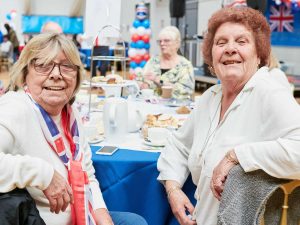
As we mark Mental Health Awareness Week, our Head of Grants, Allan Anderson, looks at the role that social prescribing can play in helping people improve their mental health, make new friends, gain practical support and connect with their local community.
“For EECF, tackling mental health is a key priority. From our commissioned research, Vital Signs, we know that poor mental health is higher in the East End than across the rest of the country. In 2020/21, 25.3% of East End residents reported poor levels of mental health with respect to anxiety, compared to 24.15% average in England, and it was highest in Tower Hamlets, at 26.9%. With the cost of living crisis disproportionately affecting our residents, we know that issues around anxiety will be on the rise.
Many of the things that affect people’s health and wellbeing – such as loneliness, stress, financial hardship and poor physical health – can’t be treated by doctors or medicine alone. This is where social prescribing comes in. It is a way for GPs, nurses and other primary care professionals to refer people to local, non-clinical services. It can help change the circumstances that make people unwell.
Social Prescribing Link Workers based, for instance, within GP practices, work with people to understand their needs, offer information and advice, and refer them to access support in the community. This support can include financial advice services, a community exercise group or an art class. The aim of these non-clinical referrals is to access the front-line community expertise and support to meet the practical, social and emotional needs that affect people’s health and wellbeing.
From my background in running projects for people with long-term health conditions, I’ve seen first-hand how accessing peer support can help people manage the practicalities of living day-to-day. Conditions such as mental health can carry social stigma, so peer support can also provide a safe and supportive space.
According to the National Academy of Social Prescribing, ‘evidence suggests that social prescribing can have a positive impact on a very wide range of outcomes, including decreases in loneliness, symptoms of anxiety and improvements in mental health…social connections and in overall wellbeing.’
EECF is supporting residents improve their mental health
We’ve a strong track record of funding and managing projects that improve residents’ physical and mental wellbeing. Last year, nearly 1,000 young people took part in sports and exercise through our funded projects, with 700 reporting improved physical and mental well-being as a result. Over 1,300 older people took part in social activities to reduce isolation. Christine Smith (left in the photo) attends our regular Tea Dance. ‘I do not get out a lot. With age comes mobility issues. Having to go into lockdown was unpleasant, not being able to see loved ones. It can affect anyone’s mental health negatively. That’s why EECF’s Tea Dance is vital for older people to have good times and make happy memories.’

Now EECF is partnering with NHS North East London on a pilot scheme to fund new projects and groups across Tower Hamlets that support local residents’ physical and mental health. The projects will prioritise supporting people who are referred by social prescribers, including local GPs.
These projects will focus on tackling mental health, social isolation and loneliness through befriending services, particularly supporting residents with limited English, those who are housebound or residents with disabilities. Befriending will also include accompanying residents so that they can take part in local activities and feel connected to their community. Projects will also provide opportunities for older men and men from Bangladeshi communities to have access to arts as well as peer support so that they feel comfortable to talk about their emotions and how to improve their wellbeing.
We’ll also be funding projects for Black Caribbean and African residents with long-term health conditions, to offer physical activity sessions, culturally appropriate cooking classes and healthy eating advice.
And given, the cost-of-living crisis, we’re funding projects that fund community outreach to link up vulnerable residents with food banks providing advice and information on support that’s available to residents for their energy, housing and food costs. There will be a particular focus on people with long term health conditions and disabilities, people on pre-payment meters and families with children.
As a needs-led, grant-making charity, making sure our funds are impactful is central. This pilot project, which will run for eleven weeks, will provide us with monitoring and feedback so that we can understand if it is successfully meeting the needs of our community.
If you are an organisation that would like to apply for this fund click here. Please note the deadline is Monday 22 May, and our grants team are on hand to answer any questions and support you with your application.
Click here to find out more about the impact of our work.
wordpress theme by initheme.com


